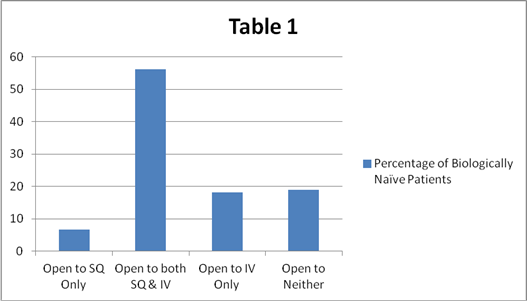Session Information
Date: Tuesday, November 10, 2015
Title: Health Services Research Poster III: Patient Reported Outcomes, Patient Education and Preferences
Session Type: ACR Poster Session C
Session Time: 9:00AM-11:00AM
Background/Purpose:
Multiple biologic treatment modalities
are available for managing systemic inflammatory disease states. Patient
preference regarding routes of administration is frequently unclear and has not
been well studied. Existing literature demonstrates that patient involvement and
shared decision-making lead to greater levels of compliance and patient
satisfaction (1). Additionally, correlation with demographic variables may
assist the physician in tailoring individualized patient care. The goal of
this study was to assess openness to and preferences for subcutaneous (SQ)
versus intravenous (IV) routes of medication administration for biologic disease
modifying medications in inflammatory rheumatologic disease states.
Methods:
Patients from a suburban
outpatient rheumatology practice with a diagnosis of RA, PsA or AS were asked
to complete a survey. Responses were reported anonymously and health care
providers were blinded to results. Consecutive patients during a 3-month
period were queried about their openness to and preferences for the use of a
self administered SQ and/or IV biologic disease modifier. Data was analyzed
using a two sided t-test and ANOVA. Subset analyses of gender, age and disease
state were also explored.
Results:
A total of 236 subjects completed
the survey and were considered for analysis (females: 73.7%; mean age: 60
years). Survey participants included 172 subjects with RA, 48 subjects with PsA
and 24 subjects with AS; 107 (46.7%) were naïve to the use of a biologic DMARD.
Openness to SQ and/or IV routes in subjects naïve to biologic disease modifiers
can be seen in Table 1.
Overall, patients preferred IV to
SQ route (34.2% vs. 25.3%, p=0.039) and 31.1% had no preference. Biologically
naive patients preferred IV to SQ (34.0% vs. 18.9%, p=0.013), and 32.1% had no
preference. Patients over the age of 60 preferred IV to SQ (41.4% vs. 12.5%,
p=0.026), while those less than age 40 preferred SQ to IV (50% vs. 27.7%,
p=0.008). Females preferred IV to SQ while males did not have a preference. PsA
patients preferred SQ to IV (45.2% vs. 9.7%, p = 0.001)
while RA patients preferred IV to SQ (36.2% vs. 23.2%, p=0.007).
Conclusion:
The results of the survey reveal
that the majority of patients with inflammatory arthritis are open to the use
of biologic agents. Surprisingly, in office infusion was preferred overall to
subcutaneous injection. Differences exist between age groups, gender, disease
and current biologic use. When considered, these variables can aid the
clinician in tailoring care and may also have broader implications on future pharmacologic
manufacturing.
References:
1. Lindhiem O, et al., Client
preferences affect treatment satisfaction, completion, and clinical outcome: A
meta-analysis. Clin Psychol Rev. 2014;34(6):506-517.
To cite this abstract in AMA style:
Kwiatkowski A, Grisanti L, Grisanti J, Hatem J. Patient Preferences Regarding Route of Biologic Administration in an Inflammatory Arthritis Cohort [abstract]. Arthritis Rheumatol. 2015; 67 (suppl 10). https://acrabstracts.org/abstract/patient-preferences-regarding-route-of-biologic-administration-in-an-inflammatory-arthritis-cohort/. Accessed .« Back to 2015 ACR/ARHP Annual Meeting
ACR Meeting Abstracts - https://acrabstracts.org/abstract/patient-preferences-regarding-route-of-biologic-administration-in-an-inflammatory-arthritis-cohort/

